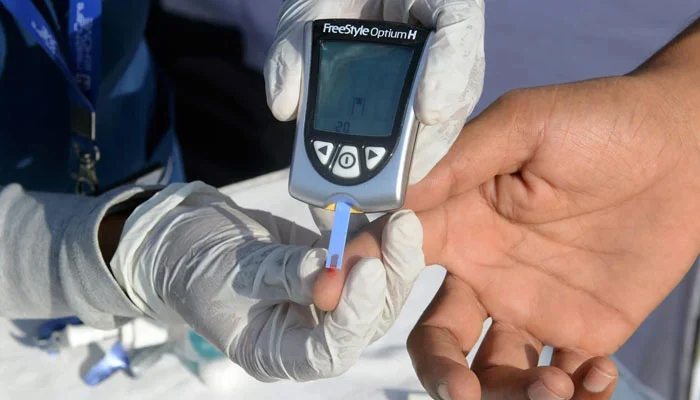‘Lifestyle medicine can help Pakistanis in diabetes remission’
Instead of taking life-long medicines or insulin for sugar control, diabetes remission can be achieved by sticking to the six pillars of lifestyle medicine — healthy nutrition, regular physical activity, stress management, avoidance of risky substances, restorative sleep and social connections — experts said on Sunday.
“People can achieve diabetes remission, which means they can get rid of taking daily medication or even insulin, by adopting lifestyle medicine,” said LM expert Dr Munira Abbasi while addressing a workshop on diabetes remission in Karachi.
“All they have to do is take healthy unprocessed diet, exercise regularly on a daily basis, manage stress, avoid addiction, get restorative sleep and have strong social connections.” Titled ‘Diabetes Remission Through Lifestyle Modification’, the workshop was held under the Discovering Diabetes project of PharmEvo, and it was attended by senior and mid-career healthcare professionals, endocrinologists and medical graduates at a hotel.
The health professionals who attended the workshop from all over the country were convinced that LM has opened new avenues of treatment of diabetes and removed several myths attached with the disease.
The workshop conducted by Dr Munira, who is associated with the Riphah Institute of Lifestyle Medicine, Islamabad, led to the conclusion that diabetes is preventable by adopting a healthy lifestyle.
The doctor, who has a triple board certification in internal medicine, endocrinology and LM, shared her journey of how she came to this achievement after practising for more than seven years in the US in the beginning of her professional career, then spending a number of years in the profession back home in Pakistan.
“I always found myself unsatisfied with the feedback of patients when I saw them complaining about their health conditions which were not improving despite treatment. So, being a doctor we always found solace assuming that we’re trying our best, and it’s the patient who doesn’t want to improve,” she said.
“But finally, I realised that’s not the case. We as doctors need to improve to make patients realise that they should also make their contribution to improving their health conditions. And here comes lifestyle medicine.”
She referred to the six pillars of lifestyle medicine: taking plant-based nutrition, engaging in physical activity, managing stress, avoiding risky substances, getting restorative sleep and maintaining social connections.
Regarding social connections, she said people, including healthcare professionals, realised the importance of this factor more during the Covid-19 pandemic, when social distancing was imposed by the authorities.
“The impact of social connections was most prominently established and published in the Grant Study, a research conducted by the Harvard University spanning over 80 years, and one of the world’s longest studies of adult life.
“Of the original Harvard cohort recruited as part of the study, only 19 are still alive, all in their mid-90s. Among the original recruits included former US president John F Kennedy.
“The surprising finding is that our relationships, and how happy we are in our relationships, has a powerful influence on our health. The study has proved that embracing community helps us live longer and be happier.”
Diabetologist Prof Dr Abdul Basit also addressed the workshop, saying that there are over 33 million diabetics in Pakistan, many of whom have not even been diagnosed, while scores of them are living without controlled diabetes. He advised people to improve their lifestyle to prevent and control their disease.
“Type 2 diabetes is a lifestyle disease, and the best option is to prevent a person from becoming diabetic. Even if a person becomes diabetic, they can live a normal life by adopting lifestyle medicine.”
-
 Chinese New Year Explained: All You Need To Know About The Year Of The Horse
Chinese New Year Explained: All You Need To Know About The Year Of The Horse -
 Canadian Passport Holders Can Now Travel To China Visa-free: Here's How
Canadian Passport Holders Can Now Travel To China Visa-free: Here's How -
 Glen Powell Reveals Wild Prank That Left Sister Hunting Jail Cells
Glen Powell Reveals Wild Prank That Left Sister Hunting Jail Cells -
 Edmonton Weather Warning: Up To 30 Cm Of Snow Possible In Parts Of Alberta
Edmonton Weather Warning: Up To 30 Cm Of Snow Possible In Parts Of Alberta -
 'A Knight Of The Seven Kingdoms' Episode 5: What Time It Airs And Where To Stream
'A Knight Of The Seven Kingdoms' Episode 5: What Time It Airs And Where To Stream -
 Amy Schumer Drops Cryptic Message On First Valentine Amid Divorce
Amy Schumer Drops Cryptic Message On First Valentine Amid Divorce -
 Savannah Guthrie Sends Desperate Plea To Mom Nancy Kidnapper
Savannah Guthrie Sends Desperate Plea To Mom Nancy Kidnapper -
 NBA All-Star 2026 Shake-up: Inside The New USA Vs World Tournament Format
NBA All-Star 2026 Shake-up: Inside The New USA Vs World Tournament Format -
 Warner Bros Consider Reopening Deal Talks With Paramount, Says Reports
Warner Bros Consider Reopening Deal Talks With Paramount, Says Reports -
 Andrew Mountbatten Windsor Faces Future With UK MPs, Says Expert
Andrew Mountbatten Windsor Faces Future With UK MPs, Says Expert -
 Eva Mendes Shared Bedroom Photos For Ryan Gosling On Valentine’s
Eva Mendes Shared Bedroom Photos For Ryan Gosling On Valentine’s -
 Shamed Andrew Told 'nobody Is Above The Law' Amid Harrowing Silence
Shamed Andrew Told 'nobody Is Above The Law' Amid Harrowing Silence -
 Gisele Bundchen Melts Hearts With Sweet Bike Ride Glimpse Featuring Son
Gisele Bundchen Melts Hearts With Sweet Bike Ride Glimpse Featuring Son -
 Prince William Found Meghan Markle ‘quite Refreshing’ At Start
Prince William Found Meghan Markle ‘quite Refreshing’ At Start -
 Kate Middleton Knew Should Could Not Be ‘voice Of Reason’ With Prince Harry
Kate Middleton Knew Should Could Not Be ‘voice Of Reason’ With Prince Harry -
 Rihanna Has Wardrobe Malfunction At A$AP Rocky Fashion Show
Rihanna Has Wardrobe Malfunction At A$AP Rocky Fashion Show




